Resisting the strong heat of the sun, a woman devotes her entire attention to cutting the overgrown grass on her fields, wielding a machete with unwavering strength.
.
Previously, the responsibility of clearing grass from the farmland had always rested upon the men in the household. However, the tide is shifting, and women are now finding themselves compelled to shoulder these duties.
The image depicts a woman named Nang Yin clearing the tall grass. She was born in the Pone Inn region under Hopone Township, Taunggyi District, Shan State.
The Pone Inn region undergoes a unique phenomenon in which it submerges underwater for six months before resurfacing as dry ground for the remaining six months of the year. During the land-dominated season, locals rely on motorbikes and cars for mobility. When the region becomes a watery landscape, the locals adjust by using boat transport. The Pone Inn region has gained recognition as the “second Inle Lake,”
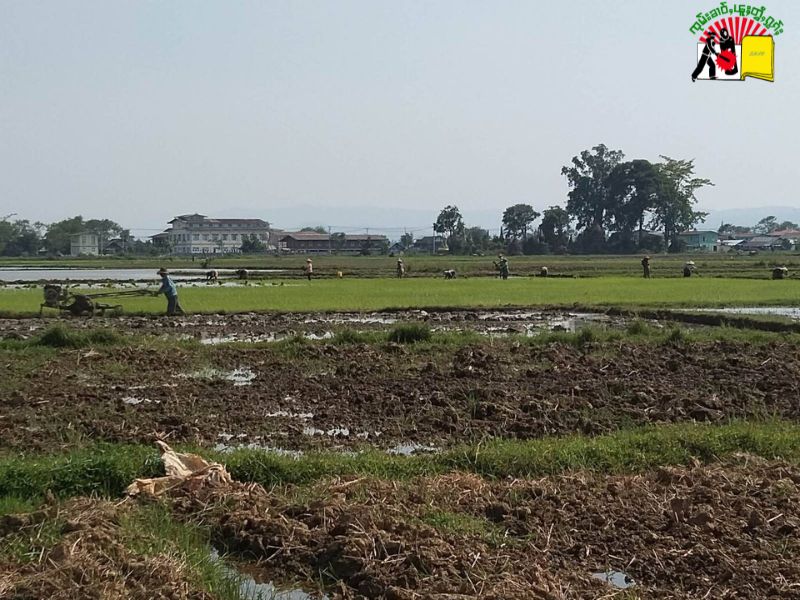
The region of Pone Inn is renowned for its cultivation of rice and garlic, with the rice produced there gaining popularity across Shan State. However, following the military coup, many young individuals from Pone Inn have migrated to Thailand in search of work, while the remaining men in the area have unfortunately become drug addicts. As a result, women have taken on a variety of responsibilities, including holding knives and clearing the untamed grass in the fields.
“Unfortunately, my elder son has fallen into drug addiction, and since my husband was addicted to alcohol, we ended up getting divorced,” Nang Yin said. ” My daughter is currently working in Tachilek, leaving me with no help in farming. As a result, I’ve had to take on the task of overseeing everything, including the paddy field work.”
According to Nang Yin, the floods from the previous year’s rainy season resulted in significant losses for many individuals who had cultivated paddies, leading to difficulties in renting and cultivating paddy fields this year.
Despite her family owning approximately 25 acres of paddies land, the lack of available workforce and her sole efforts allowed her to cultivate rice fields on only 15 acres, which she was clearing the wild grass off.
Nang Yin lamented, “In the past, before falling into addiction, my eldest sons used to operate a tractor. But now I have to struggle alone, so we do not yield like before. The young people in our area are either going to Thailand for work or or they are drug addicts who remain here.” Nang Yin further emphasized the prevalent issue, stating, “Drugs are easily accessible,” highlighting the abundance of drugs within the Pone Inn neighborhood.
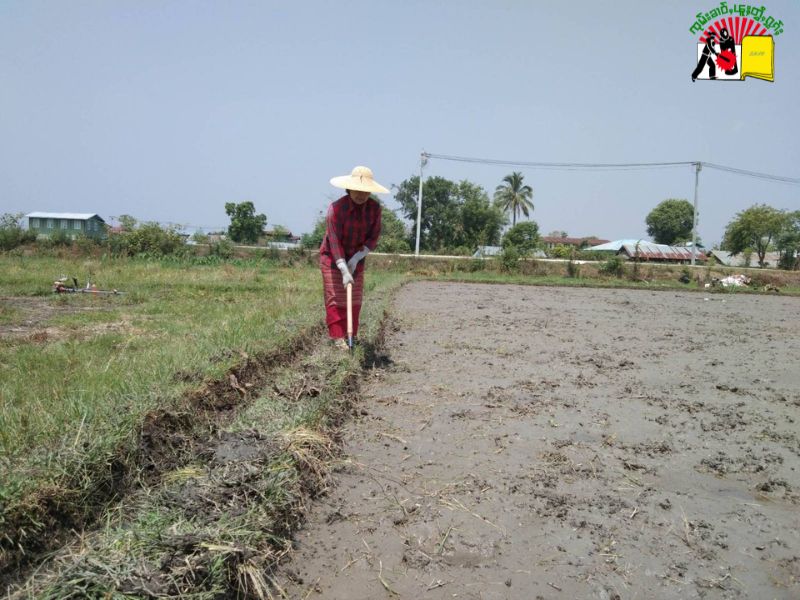
Nang Yin’s eldest son actively assisted her with paddy field work three years ago. Unfortunately, after indulging in drug experimentation with his friends, he slipped into addiction and is now trapped, unable to break free.
Nang Yin stated that following the military coup, there has been a significant increase in the availability and prevalence of drugs within the Pone Inn area. It appears that a vast majority of the young individuals working in farming are actively engaged in drug use.
“There are a variety of drugs spreading in the village. Thus if young people are not able to take control of themselves, they would get wasted. The narcotic/drugs that were said to be expensive in the past are not very cheap. Some young people are pooling their resources to purchase drug packages, with each package containing approximately 50 pills. These drugs are also available at a remarkably low price of 1000 MMK (approximately 0.48 USD) for three tablets,” said Nang Yin.
The Pone Inn area is also grappling with soaring commodity prices. A family meal costs at least 3,000 kyats, whereas a single narcotic tablet costs only around 1,000 kyats.
“It’s alarming how easily one can fall into drug addiction due to the affordability of drugs compared to food,” she added. “With nearly the entire village now caught up in drug use, we women are facing tremendous challenges,” Nang Yin lamented.
Very few families in Nang Yin’s neighborhood whose members are not using narcotics. Every household uses drugs, no matter where you look.
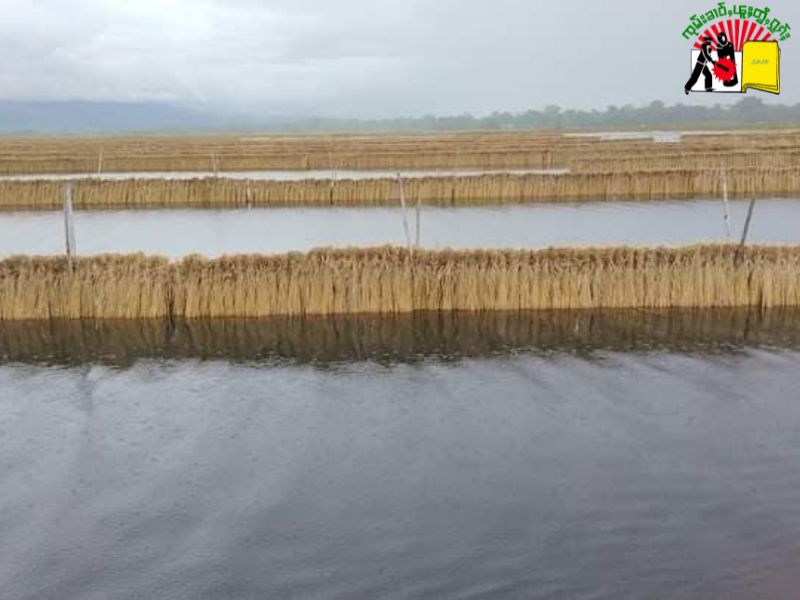
The Pa-O Militia group (Pa-O National Organization), which is under the military council, controls the Pone Inn area, where the drug problem is prevalent. While they make infrequent arrests of those involved in drugs and narcotics, they have not taken considerable steps to actively combat drug use.
If the PNO troops apprehend a drug user, they must pay approximately 1,000,000 MMK for their release. If the detainee is unable to pay, he or she will be beaten and arrested.
Residents of Pone Inn believe that these arrests appear to be more about extorting money from the community with arms than actively combating the drug problem.
“In these difficult times, the PNO is finding ways to extract money from the people. If the money collected was utilized for rehabilitation purposes and assistance to drug users, it would be worth it. However, currently, it appears to be nothing more than extortion, “said a lady in her forties from the Pone Inn area.
There is a significant shortage of available day employees for households with no male family members, such as Nang Yin’s. As a result, many families are forced to do their own farming.
According to Nang Aung, a Pone Inn resident, “there is a lack of laborers and workers for paddy field work. Some young people have been addicted to narcotics, while others have sought work in Thailand. As a result, it appears that I have to labor alone on the farm.”
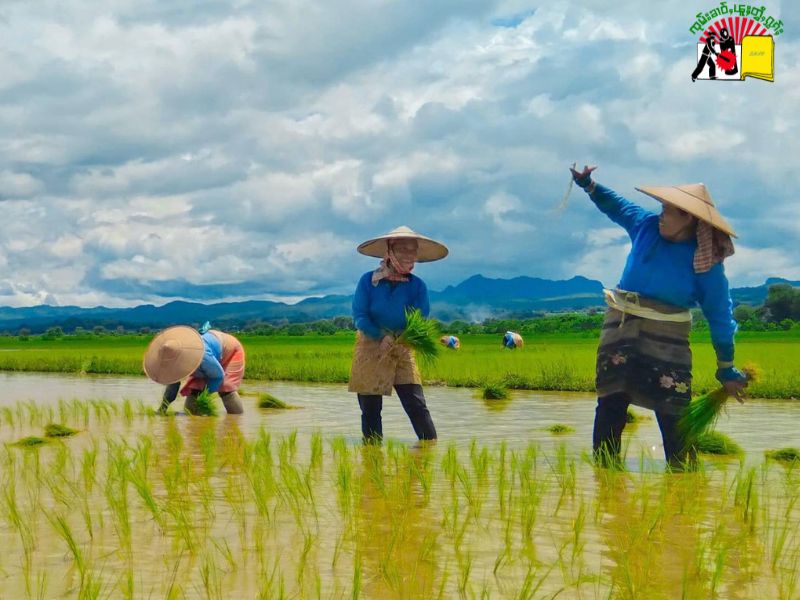
Nang Aung used to hire day laborers every year to work on paddy fields passed down through her family. However, there has been a scarcity of everyday labor in recent years as commodity prices have risen. As a result, Nang Aung is compelled to work on her own, despite her aversion to working on the farm.
“I can’t decide whether I should cultivate rice paddies. Our crops were damaged by floods last year. That’s why, in such a difficult situation, I’m at a loss and not sure of what to do,” Nan Aung lamented.
During these challenging times, when drugs are rampant and everyone is facing difficulties, But still, it is essential to strive for survival.
“In Pone Inn area, if we are not working on the farm, there is no other alternative for our livelihood,” expressed Nang Aung. “Farming is our only means to meet our basic needs, but it now requires substantial investment and startup. Additionally, the rising prices of commodities have made everything more expensive. We sincerely hope that the prices of goods do not continue to rise.”
Last year, in August 2022, a flood in Pone Inn area swamped and damaged over 20,000 acres of farmland in Hsi Hseng and Taunggyi townships.
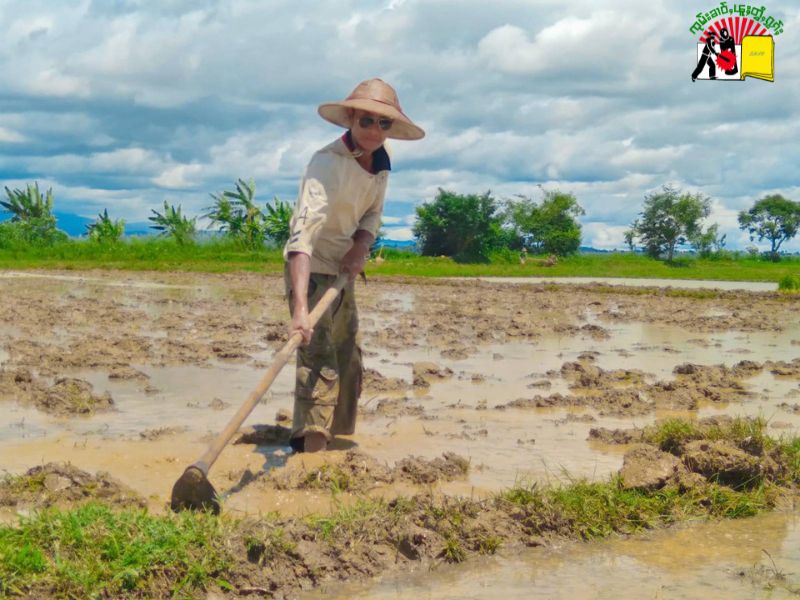
Farmers in Pone Inn area sustained losses when several acres of rice were inundated, forcing them to reach a point where there was a rice shortage for consumption. As a result, they must rely on rice donated to the monastery and purchase rice from other sources.
“Last year, our grains were submerged in water, leaving us without any rice to eat,” expressed Sai Pha. “After selling the remaining rice, prices increased again, and the farmers had nothing left to sell. There was a scarcity of rice, leading people to rely on rice from monasteries and external purchases.”
Nang Yin shared her concerns, stating that the political turmoil has placed farmers in Pone Inn area in increasingly difficult situations each year when it comes to engaging in farm work. With the rise in drug use, she fears that by next year, there may be a severe shortage of laborers available to work on the farms. Furthermore, she expresses concern that the number of drug users will continue to rise, exacerbating the challenges faced by the community.
Nang Yin expresses her concern that the farm work, which has been passed down to her from her ancestors, may come to an end during her generation.
“We cannot continue farming until we reach old age,”she shares. She further voiced her concern, “I am worried that there will be no one to inherit our ancestral farms. If this trend continues, the paddies cultivation will gradually disappear”.





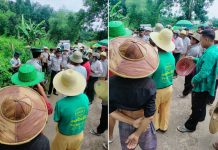
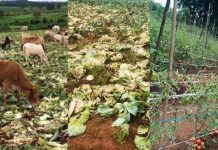

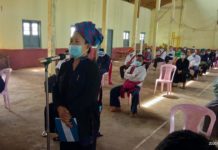
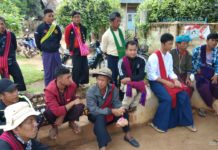






Leave a Comments